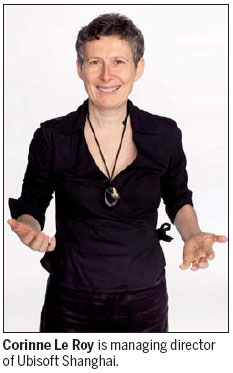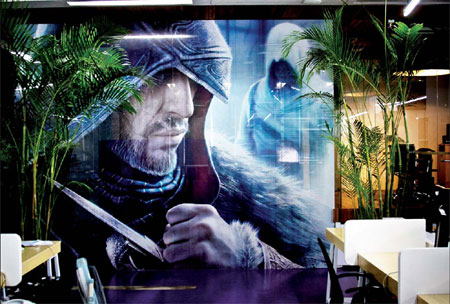Changing the game
Updated: 2013-01-06 10:38
By Su Zhou and Lin Jing (China Daily)
|
||||||||
|
A thin, decorative cloth adorned with the image of the main character from the Assassin's Creed 3 video game hangs in the office of Ubisoft Shanghai. Provided to China Daily |

Console gaming majors pin hopes on China as traditional markets lose steam
Though casual and social gaming is stealing a march over video games in the console gaming market, some companies are still betting big on the popularity of their flagship products in emerging markets like China to counter the threat posed by devices like iPads and iPhones.
Shrinking margins and dwindling sales have forced most of the big names in the console gaming industry to curtail operations and pull back on new game developments. But French video gaming publisher and developer Ubisoft Entertainment S.A. has decided to chart a new course by launching Chinese versions of its popular Assassin's Creed game.
Assassin's Creed is one of the top-ranked games in China. Launching an official Chinese version of the game will not only give Ubisoft a potential edge in the market, but also offer opportunities to reach out to more customers on the mainland.
The company has already submitted a Chinese version of Assassin's Creed 3 to the authorities for approvals. It is expected to officially launch the game after receiving publishing agreement number.
"The global gaming industry has grown from 300 million customers a few years ago to more than 1 billion customers, and with that kind of growth the future looks certainly exciting," says Corinne Le Roy, managing director of Ubisoft Shanghai. "In China, Ubisoft is working hard to bring the newest experiences to local gamers."
Assassin's Creed is one of Ubisoft's most successful franchises since its launch in 2007. According to the company, more than 40 million copies of Assassin's Creed have been sold before the launch of Assassin's Creed 3 on Oct 30. By Dec 16, about 7 million copies of the latest version were sold worldwide, making it the fastest-selling title in the company's history.
Xue Yongfeng, an analyst with consulting firm Analysys International, says that much of the new growth in the global console gaming market is being driven by China.
"Traditional video gaming markets like North America and Japan are shrinking, while emerging markets like China are booming," Xue says.
The advent of social (and sometimes free) gaming has been a big blow to console gaming leaders like Nintendo, Microsoft and Sony.
"Online and mobile games have taken most of the market share. No one wants to buy expensive console games if they can enjoy the same pleasure on social networking websites, or on Apple's App Store," Xue says. "Gone are days when gaming was done by using a mouse or a controller."
Digital investment bank Digi-Capital has in its Global Games Investment Review 2012 forecast that online and mobile games would take 50 percent of the gaming software revenue pie estimated at around $41 billion, while the historically strong pure console sector is expected to trend flat to down.
Digi-Capital forecasts that Asia Pacific and Europe will account for more than 90 percent of the online and mobile games revenues, with China accounting for 49 percent, while Japan and South Korea will have 14 and 11 percent.
"Console gaming is facing challenges but it's certainly not dying," Le Roy says. "Customer interactions and playing techniques are fast evolving and changing. It is important for companies like Ubisoft to keep pace with the developments and innovate to stay ahead."
Le Roy says that the real challenge for Ubisoft in the next 10 years would be to launch different products for customers across various geographies and keep them engaged and entertained."
Tim Merel, managing director of Digi-Capital, admits that while reports on the death of console gaming is an exaggeration, it is important for companies to evolve and respond quickly to market changes.
At the same time Merel also feels companies like Ubisoft should establish their presence in the online and mobile gaming market. "The entry of such companies will lead to strong brands, larger installed user bases, strong cash flows, and 'AAA' game designs.
"Perhaps the greatest advantage from such a move will be the players who have been trained for decades to pay for fun. This is a specific advantage that many free-to-play games companies can only dream about," Merel says.
Even though driven mainly by hardcore games such as Assassin's Creed, casual and free-to-play games have also played a role in Ubisoft's growth. For the quarter ending June 30, Ubisoft reported a 112 percent growth in online sales, driven largely by its free-to-play titles.
Like its peer Electronics Arts, Ubisoft is also making tentative strides in social and mobile gaming. It has teamed up with Facebook by launching its popular Smurfs & Co game on the social networking platform in August 2011.
Ubisoft CEO Yves Guillemot revealed in 2011 that "Smurfs went from zero to 4.2 million without any marketing in just two weeks". The game was a top performer on Facebook, with more than 10 million monthly average users.
"Games are interesting if they have good quality and great user experience; users will not care if it is a casual game or a hardcore game," Le Roy says. "And we can entertain our users by adding more interesting ways to play it, and not only with controllers or a mouse, but with more devices."
Ubisoft has always been one of the fast movers in the gaming sector. When Nintendo's Wii became the first platform that took motion control mainstream, Ubisoft capitalized on it with games like Just Dance and Red Steel. When Microsoft's Kinect for Xbox 360 expanded on the concept of motion control and added new controls like voice recognition, Ubisoft used the same in games like Ghost Recon Future Soldier.
However, with the growing popularity of iPhone and touch screens, Ubisoft is now focusing more on mobile titles for these platforms.
"Thinking ahead, there is still plenty of room for game controls to evolve," Le Roy says. "We're now seeing ways for people to play across multiple screens at the same time and play together asynchronously; 3D technology could still improve and become more mainstream.
"There are people working on prototypes of wearable computers. Even games controlled only by the player's mind might one day be possible," Le Roy says.
However, console gaming in some new emerging markets, like China, is not an easy game to play.
"Console gaming does not have a complete and mature selling channel in China. Part of the reason for this is the lack of gaming devices and poor awareness of property right protection," says Xue from Analysys. "Gaming devices are not usually introduced on the Chinese mainland and most of the Chinese users are not used to the concept of payment for entertainment."
"Fake copies of games are very popular in China. The first step for localization of casual games would be to adopt a free strategy. The most popular games in China are online games that need no pre-payment and can be played across multiple platforms," Xue says.
Contact the writers at suzhou@chinadaily.com.cn and linjingcd@chinadaily.com.cn
(China Daily 01/04/2013 page18)

 Li Na on Time cover, makes influential 100 list
Li Na on Time cover, makes influential 100 list
 FBI releases photos of 2 Boston bombings suspects
FBI releases photos of 2 Boston bombings suspects
 World's wackiest hairstyles
World's wackiest hairstyles
 Sandstorms strike Northwest China
Sandstorms strike Northwest China
 Never-seen photos of Madonna on display
Never-seen photos of Madonna on display
 H7N9 outbreak linked to waterfowl migration
H7N9 outbreak linked to waterfowl migration
 Dozens feared dead in Texas plant blast
Dozens feared dead in Texas plant blast
 Venezuelan court rules out manual votes counting
Venezuelan court rules out manual votes counting
Most Viewed
Editor's Picks

|

|

|

|

|

|
Today's Top News
Boston bombing suspect reported cornered on boat
7.0-magnitude quake hits Sichuan
Cross-talk artist helps to spread the word
'Green' awareness levels drop in Beijing
Palace Museum spruces up
First couple on Time's list of most influential
H7N9 flu transmission studied
Trading channels 'need to broaden'
US Weekly

|

|








